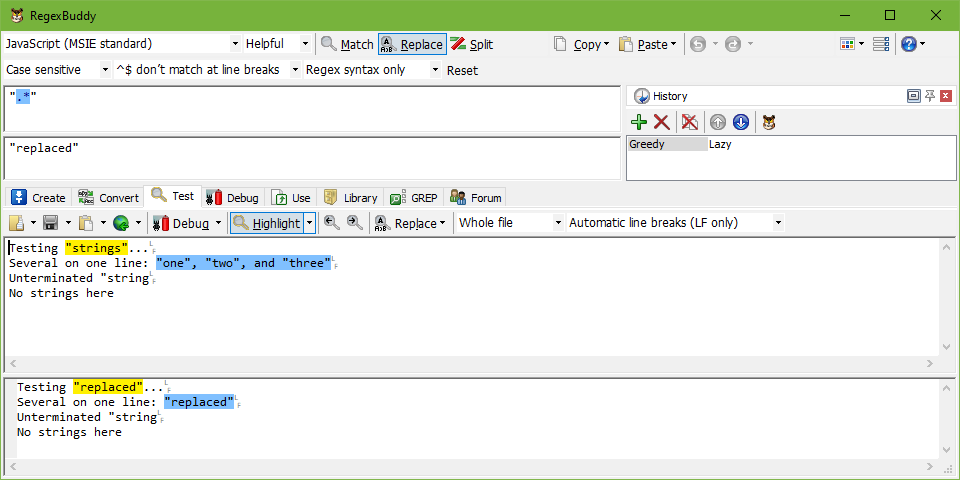

To prevent any misinterpretation, the example passes each dynamically generated string to the Escape method. ' The example displays the following output:īecause the regular expression in this example is built dynamically, we do not know at design time whether the current culture's currency symbol, decimal sign, or positive and negative signs might be misinterpreted by the regular expression engine as regular expression language operators. MatchCollection^ matches = rx->Matches( text ) Ĭonsole::WriteLine( " is not a currency value.", test) String^ text = "The the quick brown fox fox jumps over the lazy dog dog." Regex^ rx = gcnew Regex( "\\b(?\\w+)\\s+(\\k)\\b",static_cast(RegexOptions::Compiled | RegexOptions::IgnoreCase) ) Define a regular expression for repeated words. Using namespace System::Text::RegularExpressions Match the captured group that is named word. Match one or more white-space characters. Match one or more word characters up to a word boundary. The regular expression \b(?\w+)\s+(\k)\b can be interpreted as shown in the following table. However this special character (\s) will match any of the previous whitespaces.The following example uses a regular expression to check for repeated occurrences of words in a string. WHITESPACE - Generally the types of whitespace found with regular expressions are the space (\ ), the new line (\n), the tab (\t) and the carriage return (\r). * Non-captured groups are often uset to mark the boundaries or intermediary states of a regular expression in order to match the inner content of a subgroup or to ignore punctuation and any other unwanted text. NON-CAPTURED - groups need to be present within the searchable text in order to have a positive match for the regular expression however they will not be recorded nor present within the returned match. * The best aproach is to handle the balanced groups inside the callback function while deleting the outer layers of all captured groups and record their position/existence. Balanced groups are not integrated in the same manner by all programming languages and more importantly at least in the case of nesting groups the expression will have to rescan within inner layers of all the matched, captured groups slowing the entire execution. WILDCARD - ammounts for an unknown quantity of searchable text for which we can set a list of allowed characters, restrict certain characters or sequences/words and set a minimum and/or a maximum length.ĬAPTURED - groups represent parts of the searchable text that matched entirely or differents parts of the regular expression being ENCLOSED in ROUND BRACKETS (group).īACKREFERENCE - holds a reference to a captured group, a handle to that value and can be used later within the expression to balance groups or stipulate unicity or in the replace string and ultimately in the callback function.īALANCED - groups will match the N(number of occurrences) for group A and B within the searchable text and are generally used to match open and close brackets like "(" and ")" or to match html containers nesting or not. End of string or line(if multiline global flag is active).You could use the Ends with group, it too has an extra option: If you know something about the end of your "match text" You can apply more restrictions or enlarge the group further down the road using(Characters group include - characters, Characters group exclude - characters, Characters group(only these) - characters, Will NOT contain - this word/seq, Will contain this word/seq, AND will contain this word/seq). If you need to include new lines you have to select the Cross new lines(dotal mode) flag. any and new line _ all characters including new line(will enable the dotal mode flag for the whole expression).any _ all characters allowed exempt new line(will disable the dotal mode flag for the whole expression).only the characters I will select _ you can choose all allowed characters.special _ non-alphanumeric (Any language).special _ non-alphanumeric (English/Latin).alphanumeric _ non-special (Any language).alphanumeric _ a-zA-Z0-9 (English/Latin).not letter _ non-letter (English/Latin).letter _ including any diacritics (Any language).not whitespace _ non-(new line/tab/cariage return/space).


The wildcard* or/and boundary has the following CHARACTERS Group options:


 0 kommentar(er)
0 kommentar(er)
